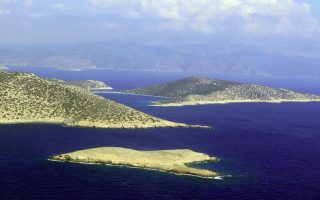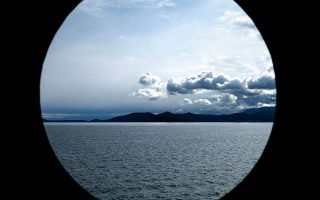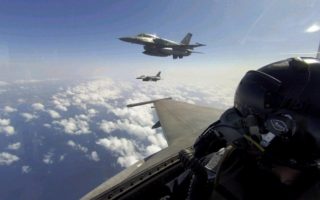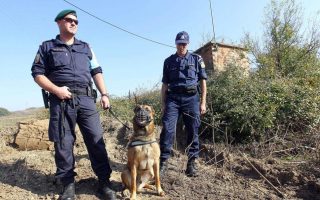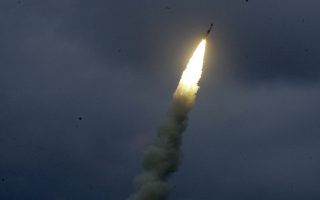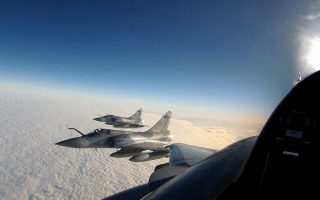NATO expands migrant mission in Aegean Sea
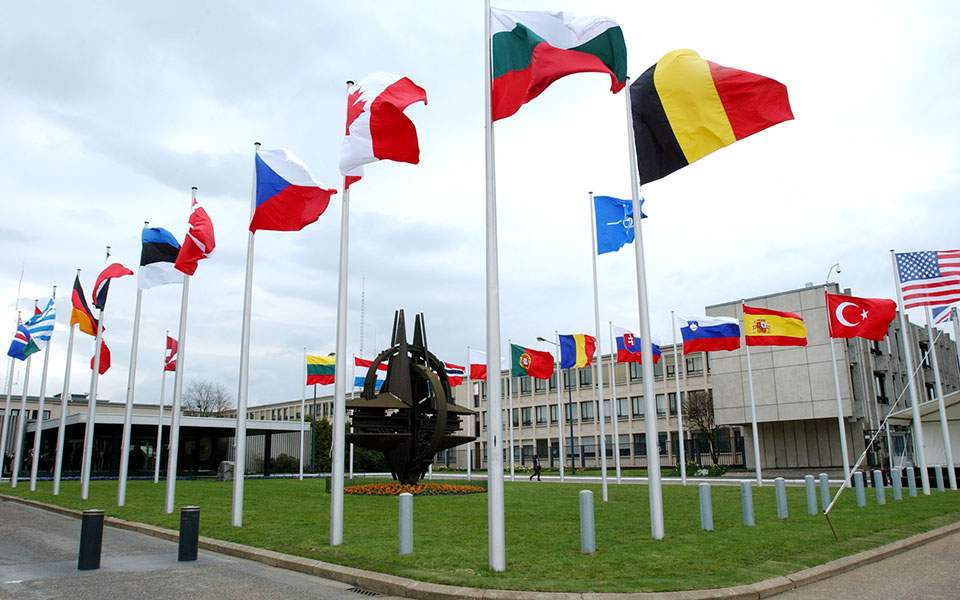
NATO announced Sunday that it was expanding its mission to help choke off the smuggling of migrants into Europe by deploying warships in Greek and Turkish waters, reinforcing its flotilla and deepening cooperation with the European Union's Frontex border agency.
Early Monday, Britain said it is contributing an amphibious landing ship backed by a Wildcat helicopter, as well as two border force cutters to the NATO force.
"We've got to break the business model of the criminal smugglers and stop the desperate flow of people crammed into makeshift vessels from embarking on a fruitless and perilous journey," British Prime Minister David Cameron said in a statement. "'
'That's why this NATO mission is so important. It's an opportunity to stop the smugglers and send out a clear message to migrants contemplating journeys to Europe that they will be turned back."
The widened mission comes after defense ministers of the 28-nation alliance on Feb. 11 ordered the immediate deployment of the three vessels in NATO's Standing Maritime Group 2 to the Aegean Sea.
In a telephone interview with the Associated Press, NATO secretary-general Jens Stoltenberg said, "We will do reconnaissance, we will do surveillance, we will collect information, and share this information in real time with the Turkish coast guard, the Greek coast guard and with Frontex, helping them with managing the migrant and refugee crisis, and also to cut the lines of the illegal trafficking and smugglers,"
The waters between Greece and Turkey, two NATO allies, are a key area where smugglers have been bringing tens of thousands of migrants into Europe, sparking what some have called the gravest crisis in the EU's history. EU and Turkish leaders will meet Monday in Brussels to discuss the emergency.
"Now we are going further by actually doing two new things," NATO's secretary-general told the AP. "We are going into Greek and Turkish territorial waters. We have agreed on arrangements for doing that."
"In addition, we have agreed with Frontex on how to work with them, how to share information so what we will do will be more efficient," Stoltenberg said.
NATO officials said the alliance's Allied Maritime Command and Frontex exchanged letters Sunday on specifics of their tactical and operational cooperation.
Now "NATO and Frontex will be able to exchange liaison officers and share information in real time, to enable Frontex, as well as Greece and Turkey, to take action in real time," NATO said in a statement.
Stoltenberg said additional NATO assets will also be sent to the Eastern Mediterranean. The German, Canadian and Turkish naval vessels deployed Feb. 11 have already been joined by a Greek unit, and Stoltenberg said France has announced it is sending a ship and that other allies are expected to follow suit.
The British announcement said the amphibious landing ship RFA Mounts Bay is expected to begin operations in the coming days-"identifying smugglers taking migrants to Greece and passing the information to the Turkish coast guard so they can intercept these boats." It said one British border force boat, VOS Grace, is already in the Aegean, that one cutter, the Protector, is on the way and another is expected to start operations later this month.
Stoltenberg stressed that NATO ships and crews "will not turn back the boats" carrying migrants, many of whom are fleeing war or poverty in their Middle Eastern or African homelands.
"What we will do is to support, assist, help the Turkish and the Greek authorities and the European Union," Stoltenberg said. He called the agreement reached for joint NATO-EU efforts in the field unprecedented.
In a statement, EU foreign policy chief Federica Mogherini and Home Affairs Commissioner Dimitris Avramopoulos hailed the "common understanding with NATO" formalized Sunday as "an important contribution to international efforts to tackle smuggling and irregular migration in the Aegean Sea."
The International Office of Migration estimated Friday that 125,819 migrants had reached the Greek islands since Jan. 1, and that 321 others drowned in the Eastern Mediterranean while attempting to make the journey across the cold, often dangerous waters.
On Monday, Stoltenberg is scheduled to meet in Brussels with Turkish Prime Minister Ahmet Davutoglu.
[AP]
